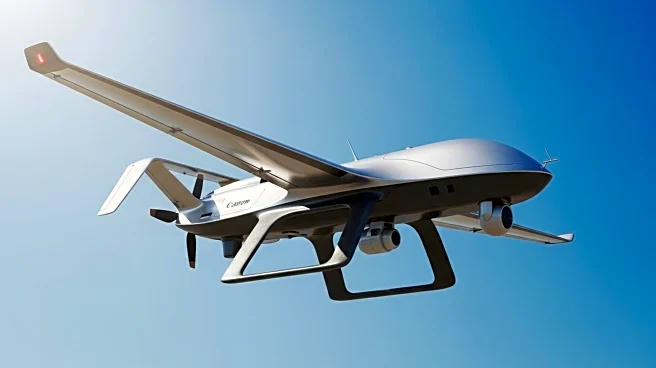What's Happening?
Pyka has introduced its latest innovation, the DropShip UAV, designed to enhance military logistics and surveillance operations. This unmanned aerial vehicle (UAV) features a combination of electric-driven and diesel-powered propulsion systems, offering a ferry range of 3,500 miles or a 1,000-mile range with a 400-pound payload. The DropShip is capable of parachuting cargo to precise locations, making it ideal for resupply missions in contested environments. Additionally, it can operate in a low-signature mode for covert missions and is equipped with modular systems for intelligence, surveillance, and reconnaissance (ISR) capabilities.
Why It's Important?
The introduction of the DropShip UAV represents a significant advancement in military logistics and surveillance technology. Its ability to deliver payloads accurately and operate in challenging environments enhances the military's operational flexibility and efficiency. The UAV's modular design allows for customization based on mission requirements, making it a versatile asset for various military operations. This development is likely to impact defense strategies, providing the military with new tools to address logistical challenges and improve situational awareness in complex scenarios.
What's Next?
Pyka's DropShip UAV is set to participate in the U.S. Army Future Command's Project Convergence Capstone 6 field testing exercise, which will evaluate its capabilities in real-world scenarios. The company has also secured a contract with the U.S. Air Force's AFWERX for further development. As testing progresses, Pyka may explore additional applications for the DropShip, including humanitarian missions and commercial logistics. The success of these initiatives could lead to increased adoption of UAV technology in military and civilian sectors.
Beyond the Headlines
The development of the DropShip UAV highlights the growing importance of unmanned systems in modern warfare. As technology advances, ethical considerations regarding the use of autonomous systems in military operations become increasingly relevant. Ensuring that these systems are used responsibly and in compliance with international laws will be crucial. Additionally, the integration of advanced UAVs into military operations may drive innovation in related fields, such as artificial intelligence and sensor technology.










